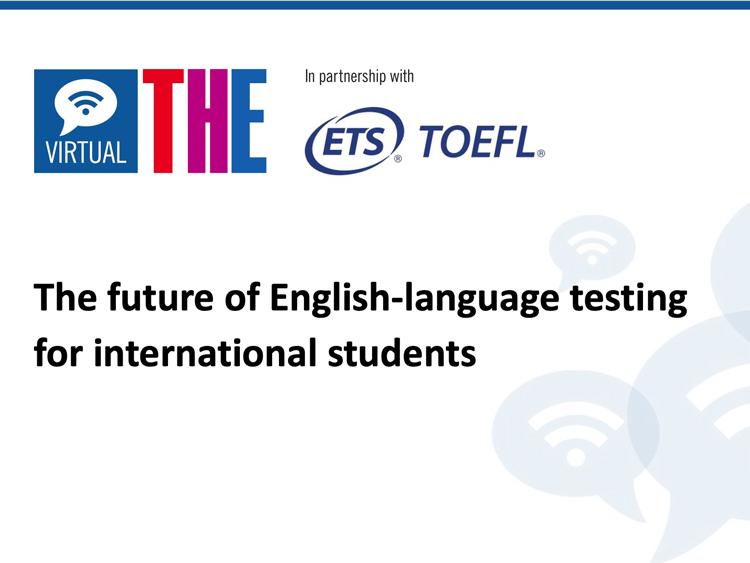Making sure that international students can study wherever in the world they want is key to improving outreach and accessibility at higher education institutions, but it is not always easy to achieve.
During a webinar hosted by Times Higher Education in partnership with TOEFL, attendees from industry and academia came together to discuss ways of ensuring students receive a fair, accurate and unbiased test for their English-language proficiency.
“In the context of the first two years of the Covid-19 pandemic, many of us found ourselves having to suddenly accept whatever online testing was available,” explained Wendy Alexander, vice-principal (international) at the University of Dundee. “That led us to rethink how we can be fair to students and what areas we needed greater assurance around. For example, how do you establish the identity of the test taker? What can we do to ensure the security of the test?”
Many institutions have been struggling with the new challenge of having to conduct classes and assessments remotely. “Fortunately for TOEFL, we started the process of exploring remote assessments long before Covid,” said Michelle Hampton, director of TOEFL Institutional Relations at ETS. “There have always been students facing challenges preventing them from physically travelling to a test centre. That’s why the option of remote testing continues to make sense and will be a permanent addition to our services.”
Of course, there is a tension between having a standardised level of English-language proficiency and an understanding that no single test can measure all the variables that may impact the student journey. “We want to see that a test has evidence of its validity and reliability,” said Fiona Orel, director of assessment and EAP tutor of International Study and Language Institute at the University of Reading. “There may also be geographical, technical or financial issues around evidencing a student’s language level. Some platforms, for example, are looking at the amount of bandwidth required for online testing. Where in-person testing is needed, is there a possibility of using more localised testing centres?”
At a time when university pedagogy is under more scrutiny than ever, digital assessment is also under the microscope. “I see tests as the gateway to start the student journey rather than the end,” said Peter Flew, associate pro vice-chancellor (academic portfolio development) and dean of the School of Education at the University of Roehampton. “It would be good if tests were designed to support and develop students. If we could improve our testing, we could gain some important statistical insights that go beyond whether a student passes or fails.”
Accessing the right data is essential to learning how students respond to being tested in different ways. “We provide performance descriptors of what the score earned by a test taker means,” Hampton said. “With TOEFL, each application for admission contains many points that you can use to compare or assess the student’s English proficiency in support of, or in contrast to, their performance on the standardised test.”
“I took over as a testing officer for BALEAP, an organisation founded to support the professional development of those involved in learning, teaching, scholarship and research in English for Academic Purposes,” Orel added. “I’m initiating a project that will result in an online resource that is regularly updated – a one-stop place to find out about a test’s construction, what it’s measuring, what you can infer from a student’s performance, and the security and accessibility of the test.”
Although testing language skills for university admission has changed markedly over the past two years, its development looks set to continue. Just as the student journey is experiencing ongoing change, English-language testing has to evolve with it.
The panel:
- Wendy Alexander, vice-principal (international), University of Dundee
- Peter Flew, associate pro vice-chancellor (academic portfolio development) and dean of the School of Education, University of Roehampton
- Michelle Hampton, director, TOEFL Institutional Relations, ETS
- Alistair Lawrence, special projects editor, Times Higher Education (chair)
- Fiona Orel, director of assessment and EAP tutor, International Study and Language Institute, University of Reading
Watch the webinar on demand above or on the THE Connect YouTube channel.
Find out more about TOEFL.


comment